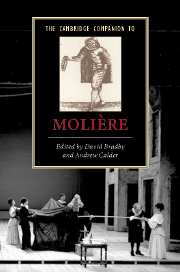Book contents
- Frontmatter
- 1 The career strategy of an actor turned playwright: 'de l’audace, encore de l’audace, toujours de l’audace’
- 2 The material conditions of Molière’s stage
- 3 The master and the mirror: Scaramouche and Molière
- 4 Molière as satirist
- 5 How (and why) not to take Molière too seriously
- 6 L’Avare or Harpagon’s masterclass in comedy
- 7 Laughter and irony in Le Misanthrope
- 8 Comédies-ballets
- 9 Le Bourgeois gentilhomme: Molière and music
- 10 Medicine and entertainment in Le Malade imaginaire
- 11 Molière and the teaching of Frenchness: Les Femmes savantes as a case study
- 12 L'École des femmes: matrimony and the laws of chance
- 13 Molière nationalised: Tartuffe on the British stage from the Restoration to the present day
- 14 Landmark twentieth-century productions of Molière: a transatlantic perspective on Molière: mise en scène and its historiography
- 15 Dom Juan the Directors’ Play
- 16 ‘Reculer pour mieux sauter’: modern experimental theatre’s debt to Molière
- Select bibliography
- Index
- Series List
11 - Molière and the teaching of Frenchness: Les Femmes savantes as a case study
Published online by Cambridge University Press: 28 March 2007
- Frontmatter
- 1 The career strategy of an actor turned playwright: 'de l’audace, encore de l’audace, toujours de l’audace’
- 2 The material conditions of Molière’s stage
- 3 The master and the mirror: Scaramouche and Molière
- 4 Molière as satirist
- 5 How (and why) not to take Molière too seriously
- 6 L’Avare or Harpagon’s masterclass in comedy
- 7 Laughter and irony in Le Misanthrope
- 8 Comédies-ballets
- 9 Le Bourgeois gentilhomme: Molière and music
- 10 Medicine and entertainment in Le Malade imaginaire
- 11 Molière and the teaching of Frenchness: Les Femmes savantes as a case study
- 12 L'École des femmes: matrimony and the laws of chance
- 13 Molière nationalised: Tartuffe on the British stage from the Restoration to the present day
- 14 Landmark twentieth-century productions of Molière: a transatlantic perspective on Molière: mise en scène and its historiography
- 15 Dom Juan the Directors’ Play
- 16 ‘Reculer pour mieux sauter’: modern experimental theatre’s debt to Molière
- Select bibliography
- Index
- Series List
Summary
Public education in nineteenth-century France was charged with the responsibility of ushering the nation into an era of modernity marked by reconstruction, and the militant republicanism of the 1880s valorised the pedagogical dimension of the State. The Republican School was, first and foremost, an ideological construct, public instruction being one of the chief objectives of French policy-makers during this period. A socio-critical approach to Republican schooling in France during this period will allow us to examine the cultural dynamics inherent in the educational process, that is, the transmission of knowledge or, more specifically, the role of traditional literary education, particularly as it sheds light on the critical reception of Molière. By propagating a series of cultural models, the Republican School sought to shape French youth according to a particular strategy. An analysis of this process clearly raises various ethical, anthropological and ethnological issues. We will attempt to demonstrate the breadth of these issues by briefly examining the Republican School in light of the socio-cultural and ideological forces at work in nineteenth-century France: 1) nationalism, or the role of ethnic identity; 2) the rise of the bourgeoisie; 3) the politics of laïcité, or the secularisation of French society; 4) the history of the teaching of French and the formation of school discourse; and 5) the influence of literary education and humanism.
- Type
- Chapter
- Information
- The Cambridge Companion to Moliere , pp. 151 - 164Publisher: Cambridge University PressPrint publication year: 2006
- 1
- Cited by



